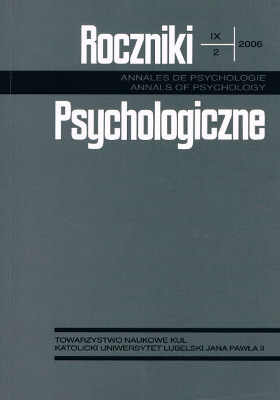The specificity of the adoptive parenthood in the light of David H. Kirk’s theory
Abstract
The article The specificity of the adoptive parenthood in the light of David H. Kirk’s theory concerns differences in functioning between adoptive and natural families as presented by a Canadian sociologist David H. Kirk. According to Kirk, there are two different coping patterns with difficulties related to self-identification as an adoptive parent: acknowledgmenet of difference between adoptive and natural parenthood or rejection of such difference. The families in which adoptive parents use the first strategy have better between-member communication and, as a result, they are much more satisfied with adoption than the families using the second strategy. In the second part of the article research inspired by Kirk’s theory is presented, especially that of D. Brodzinsky, as well as K. Kaye, and D. Grotevant.
References
Berger, P. L. (1988). Zaproszenie do socjologii (tł. J. Stawiński). Warszawa: PWN.
Braun-Gałkowska, M. (1999). Mieć dziecko, czy być matką? W: D. Kornas-Biela (red.), Oblicza macierzyństwa (s. 67-74). Lublin: Redakcja Wydawnictw KUL.
Brodzinsky, D. (1987). Adjustment to adoption: A psychosocial perspective. Clinical Psychology Review, 7, 25-47.
Brodzinsky, D. (1990). A stress and coping model of adoption adjustment. W: D. Brodzinsky, M. Schechter (red.), The psychology of adoption (s. 3-24). New York: Oxford University Press.
Grotevant, H. D. (2001). Openess in adoption: Research with the Adoption Kinship Network. Adoption Quarterly, 4, 1, 45-65.
Grotevant, H. D., Kohler, J. K. (1999). Adoptive families. W: M. Lamb (red.), Nontraditional families: Parenting and child development (s. 161-190). Mahwah, NJ: Erlbaum.
Grotevant, H. D., McRoy, R. G. (1997). The Minnesota/Texas Adoption Research Project: Implications of openness in adoption for development and relationships. Applied Developmental Science, 1, 168-186.
Grotevant, H. D., McRoy, R. G., Elde C., Fravel D. L. (1994). Adoptive Family System dynamics: Variations by level of openness in the adoption. Family Process, 33, 125-146.
Gutowska, A. (1998). Trójkąt adopcyjny. W: P. Francuz, P. Oleś, W. Otrębski (red.), Studia z psychologii w KUL (t. 9, s. 119-129). Lublin: Redakcja Wydawnictw KUL.
Hoopes, J. (1982). Prediction in child development: A longitudinal study of adoptive and nonadoptive families. New York: Child Welfare League of America.
Kaye, K. (1990). Acknowledgment or rejection of differences? W: D. Brodzinsky, M. Schechter (red.), The psychology of adoption (s. 121-143). New York: Oxford University Press.
Kirk, H. D. (1964). Shared fate. A theory of adoption and mental health. New York: Free Press.
Kirk, H. D. (1981). Adoptive Kinship: A modern institution in need of reform. Toronto: Butterworth.
Kirk, H. D. (1984). Shared fate. A theory and method of adoptive relationships. Port Angeles, WA: Ben-Simon.
Kościelska, M. (1999). Pomoc rodzinom adopcyjnym w przezwyciężaniu kryzysów tożsamości. W: K. Ostrowska, E. Milewska (red.), Adopcja – teoria i praktyka (s. 151-155). Warszawa: CMPP-P MEN.
Lazarus, R. S., Folkman, S. (1984). Stress, appraisal, and coping. New York: Springer.
Lifton, B. J. (1994). Journey of the adopted self. New York: Basic Books.
Lifton, B. J. (2004). The Ethics of Counseling Triad members. Materiały z: Adoption Institute: Anaheim conference summary, November 1999; www.adoptioninstitute.org/proed/confessions/transtest2.html; odczytane 23.06.2005.
Ładyżyńska, G., Ładyżyński, A. (2000). Adopcja jest darem. Wrocław: Wydawnictwo Wrocławskiej Księgarni Archidiecezjalnej.
Ładyżyński, A. K. (2003). Adopcja na łamach polskich dzienników w 2001 r. W: A. Kalus (red.), W świecie dziecka osieroconego i rodziny adopcyjnej. Opole: Redakcja Wydawnictw Wydziału Teologicznego Uniwersytetu Opolskiego.
McRoy, R., Grotevant, H., Ayers-Lopez, S. (1994). Changing praktices in adoption. Austin: Hogg Foundation for Mental Health.
Mead, G. H. (1975). Umysł, osobowość i społeczeństwo (tł. Z. Wolińska). Warszawa: PWN.
Milewska, E. (2003). Kim są rodzice adopcyjni? Studium psychologiczne. Warszawa: CMPP.
Milewski, R. (1998). Inne rodzicielstwo – proces ksztaltowania się tożsamości u rodziców adopcyjnych (mps pracy magisterskiej, Uniwersytet Warszawski).
Modell, J. S. (1994). Kinship with strangers. Berkeley: University of California Press.
Reitz, M., Watson, K. W. (1992). Adoption and the Family System. New York: The Guilford Press.
Rosenberg, M. (1965). Society and adolescent self-image. New York: Princeton University Press.
Sorosky, A., Baran, A., Pannor, R. (1978). The adoption triangle. Garden City, NY: Doubleday/Anchor.
Trepka-Starosta, J. (1999). Motywacja do podjęcia decyzji o adopcji. W: K. Ostrowska, E. Milewska (red.), Adopcja – teoria i praktyka (s. 67-73). Warszawa: CMPP-P MEN.
Wegar, K. (1997). Adoption, identity and kinship. New HavenLondon: Yale University Press.
Wrobel, G. M., Kohler, J. K., Grotevant, H. D., McRoy, R. (1998). Factors related to patterns of information exchange between adoptive parents and children in mediated adoptions. Journal of Applied Developmental Psychology, 19, 4, 641-657.
Copyright (c) 2006 Roczniki Psychologiczne

This work is licensed under a Creative Commons Attribution-NonCommercial-NoDerivatives 4.0 International License.


